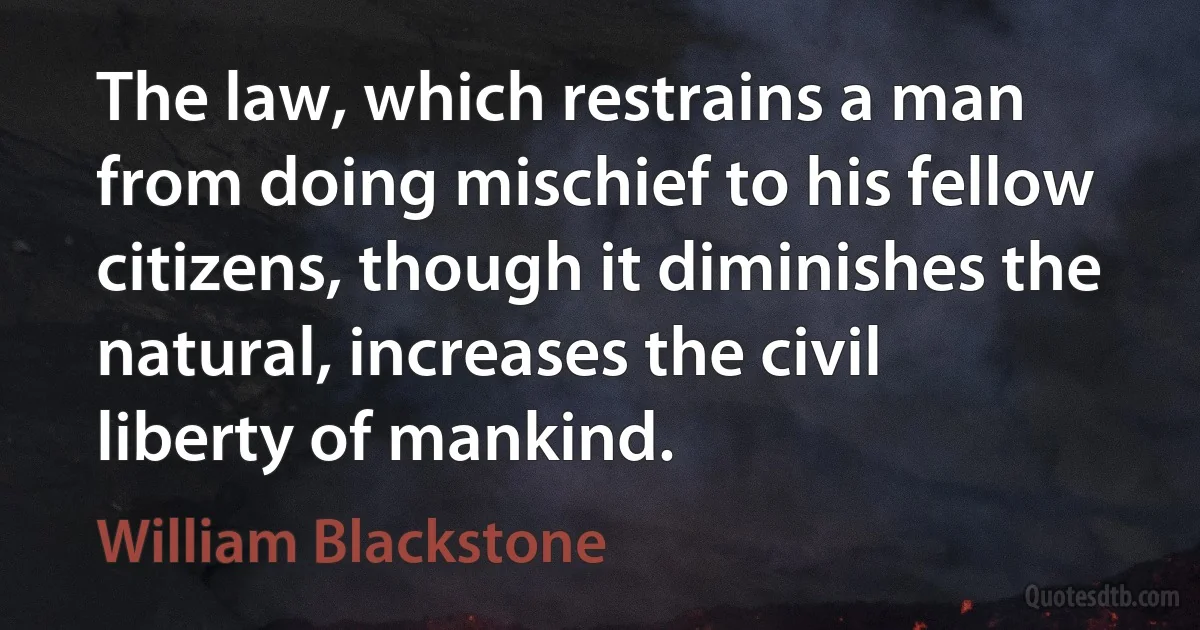William Blackstone quotes
Law, in its most general and comprehensive sense, signifies a rule of action; and is applied indiscriminately to all kinds of action, whether animate, or inanimate, rational or irrational. Thus we say, the laws of motion, of gravitation, of optics, or mechanics, as well as the laws of nature and of nations. And it is that rule of action, which is prescribed by some superior, and which the inferior is bound to obey.

William Blackstone
There is nothing which so generally strikes the imagination, and engages the affections of mankind, as the right of property; or that sole and despotic dominion which one man claims and exercises over the external things of the world, in total exclusion of the right of any other individual in the universe. And yet there are very few, that will give themselves the trouble to consider the original and foundation of this right.

William Blackstone
Of crimes injurious to the persons of private subjects, the most principal and important is the offense of taking away that life, which is the immediate gift of the great creator; and which therefore no man can be entitled to deprive himself or another of, but in some manner either expressly commanded in, or evidently deducible from, those laws which the creator has given us; the divine laws, I mean, of either nature or revelation.

William Blackstone
Man, considered as a creature, must necessarily be subject to the laws of his creator, for he is entirely a dependent being...This law of nature, being co-eval with mankind and dictated by God himself, is of course superior in obligation to any other. It is binding over all the globe, in all countries, and at all times: no human laws are of any validity, if contrary to this; and such of them as are valid derive all their force, and all their authority, mediately or immediately, from this original.

William Blackstone
The absolute rights of man, considered as a free agent, endowed with discernment to know good from evil, and with power of choosing those measures which appear to him to be most desirable, are usually summed up in one general appellation, and denominated the natural liberty of mankind. This natural liberty consists properly in a power of acting as one thinks fit, without any restraint or control, unless by the law of nature: being a right inherent in us by birth, and one of the gifts of God to man at his creation, when he endowed him with the faculty of freewill. But every man, when he enters into society, gives up a part of his natural liberty, as the price of so valuable a purchase; and, in consideration of receiving the advantages of mutual commerce, obliges himself to conform to those laws, which the community has thought proper to establish.

William Blackstone
All the several pleas and excuses, which protect the committer of a forbidden act from the punishment which is otherwise annexed thereto, may be reduced to this single consideration, the want or defect of will. An involuntary act, as it has no claim to merit, so neither can it induce any guilt: the concurrence of the will, when it has its choice either to do or to avoid the fact in question, being the only thing that renders human actions either praiseworthy or culpable. Indeed, to make a complete crime, cognizable by human laws, there must be both a will and an act.

William Blackstone
In this distinct and separate existence of the judicial power, in a peculiar body of men, nominated indeed, but not removable at pleasure, by the crown, consists one main preservative of the public liberty; which cannot subsist long in any state, unless the administration of common justice be in some degree separated both from the legislative and the also from the executive power.

William Blackstone
If the parliament will positively enact a thing to be done which is unreasonable, I know of no power that can control it: and the examples usually alleged in support of this sense of the rule do none of them prove, that where the main object of a statute is unreasonable the judges are at liberty to reject it; for that were to set the judicial power above that of the legislature, which would be subversive of all government. But where some collateral matter arises out of the general words, and happens to be unreasonable; there the judges are in decency to conclude that this consequence was not foreseen by the parliament, and therefore they are at liberty to expound the statute by equity, and only quoad hoc disregard it.

William Blackstone



